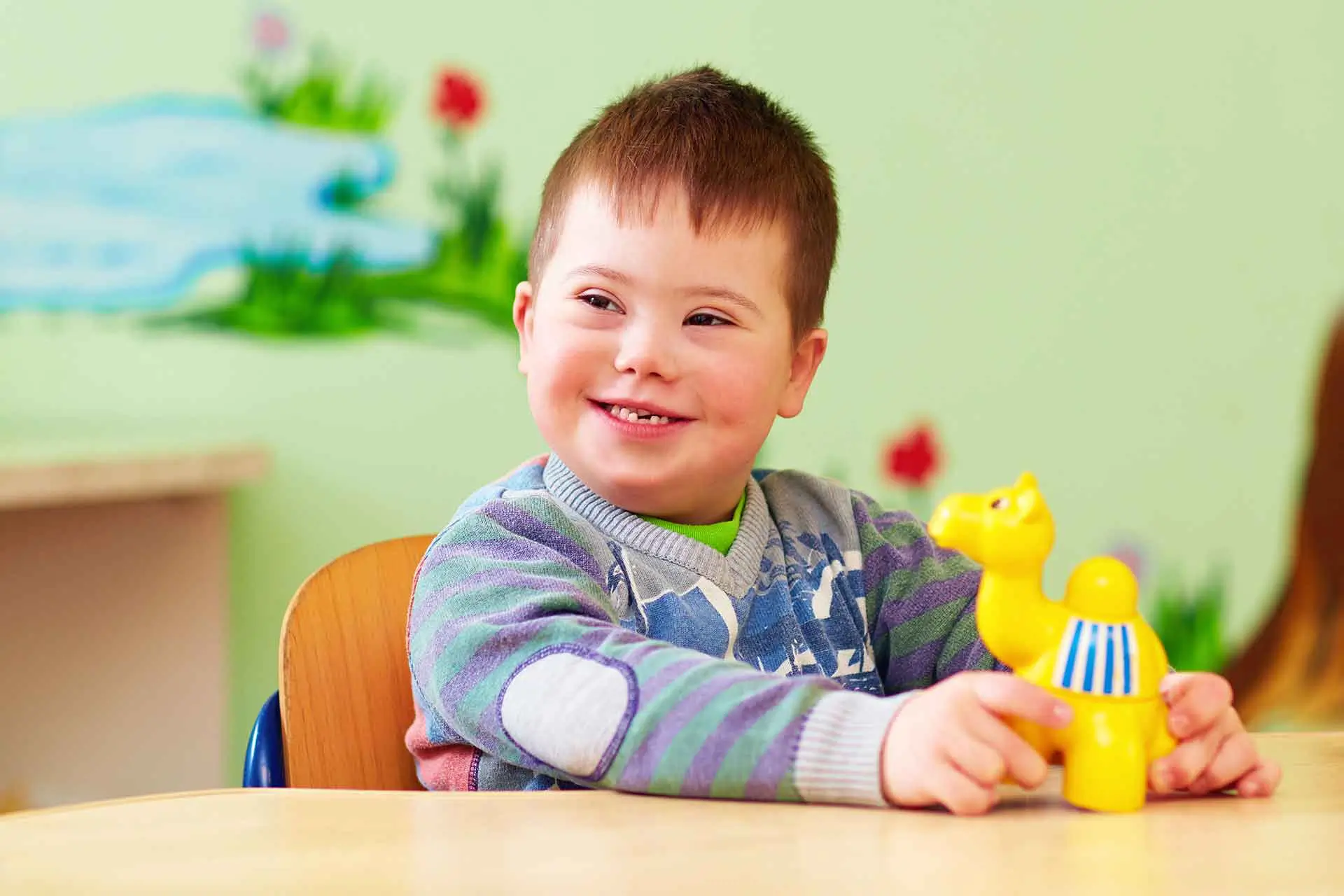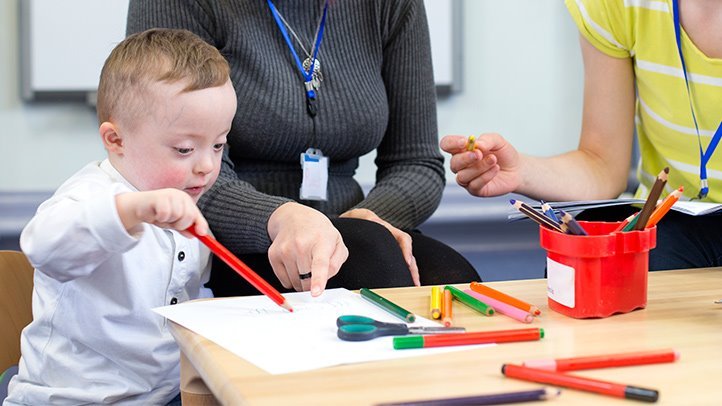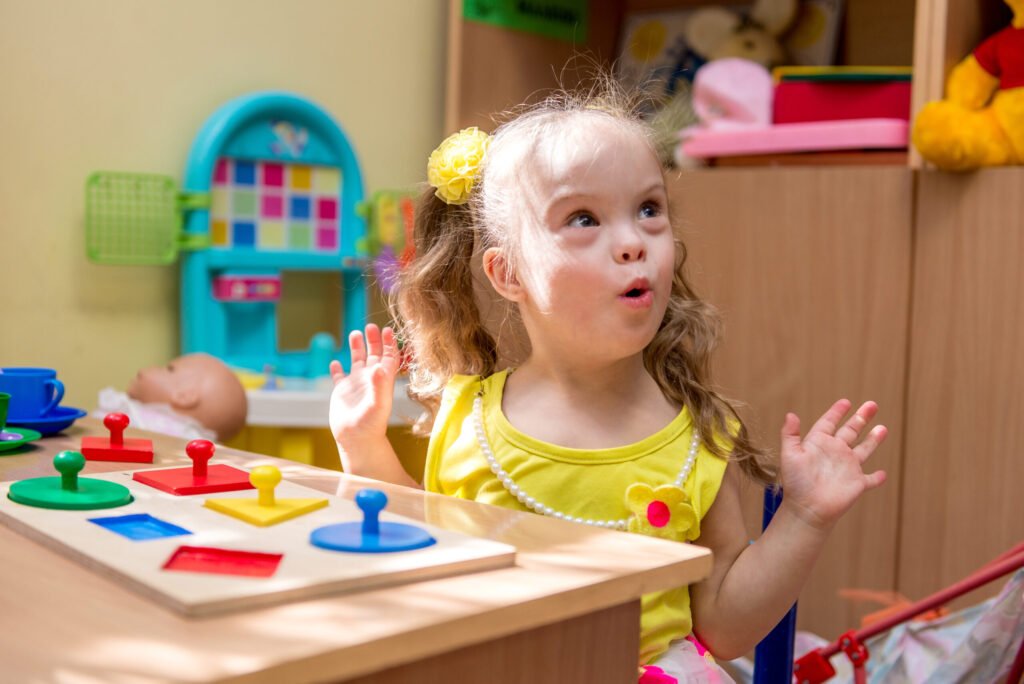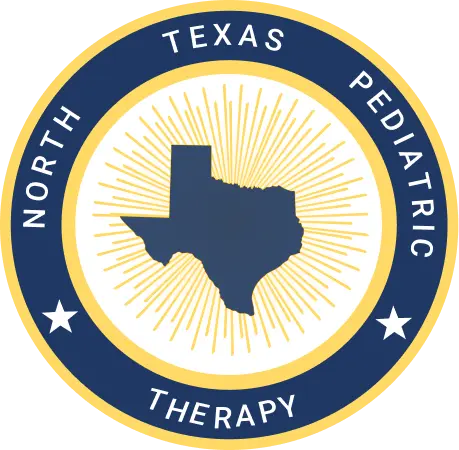If you have a child with Down Syndrome and you’ve been advised to start speech therapy, it can be a mix of excitement and nerves, right? Many questions arise when meeting a speech pathologist for the first time. Speech and language can be tricky due to differences in muscle tone and how they process information. When you meet with a Speech Pathologist, you might expect a personalized plan tailored to your child’s needs. They’ll assess strengths and challenges and work with you to help your child communicate better and become more independent.
Explore the world of Down Syndrome and how it impacts speech, language, and feeding. If you’re in Dallas, you’ve got a dedicated team of North Dallas speech therapy specialists cheering for you and your child.
We can help your child succeed via speech therapy for children with Down syndrome if we work together to overcome the challenges that this disorder presents.

What is Down Syndrome?
Before getting into the nitty gritty of Down Syndrome Speech Therapy Options, let’s briefly review Down Syndrome. As you know, Down syndrome is a genetic disease or condition that occurs when a person has an extra copy of chromosome 21 or an extra piece of a chromosome, which changes the development of their brain and body. It’s the most common chromosomal abnormality in humans, and it causes several health issues.
However, chromosomes can be described as a code of how an individual grows and develops. When this genetic code is modified, such as in the case where additional chromosomes are seen in Down Syndrome, it significantly alters how a person grows and matures. Moreover, it can cause physical and mental challenges throughout a person’s life.
The three types of Down syndrome are:
- Trisomy 21: This type occurs when each cell in the body has three copies of chromosome 21 instead of the usual two. About 95% of people with Down syndrome have this type.
- Random error in cell division: This type of error is called nondisjunction, and it causes Down syndrome.
- Age of the mother: The risk of having a baby with Down syndrome increases as the mother gets older.
What Causes Down Syndrome?
As we’ve already discussed, Down Syndrome is a genetic disease that might arise during cell division, leading to an extra copy of the chromosome. But what leads to these causes, and what triggers Down syndrome to occur?
However, there might be two cases that result in Down Syndrome. The most common one is called Complete Trisomy 21. With this type, it’s not something that’s passed down from parents—it just pops up out of the blue in about 95% of cases. This means this is not an exact reason for the abnormal division of cells. But when it comes to Translocation Trisomy 21, which is a pretty rare form of Down Syndrome but might be inherited from parents (around 2-4% of diagnoses).
As Speech Pathologists, we help kids of all ages, from little ones to grown-ups with Down Syndrome. It can make a big difference when we start teaching them how to talk early on. So, if you have a kid or an adult with Down Syndrome, Pediatric Speech Therapy can give you a boost in communicating better!
Awaken your child’s social success with North Texas Pediatric Therapy, where our speech sessions are specialized to inspire growth and confidence.
Why is Speech Therapy for Down Syndrome Important?
Speech therapists are essential for people with Down Syndrome. They help make talking, understanding, and communicating easier. They also assist with eating and swallowing. Lots of folks with Down Syndrome have trouble with speaking and understanding, which can make it hard to communicate. They might find certain sounds tricky, and some people may have difficulty understanding them when they talk.
Kids with Down Syndrome usually start talking later than other kids their age. Because of this, they often rely more on gestures and facial expressions to communicate. Speech therapy helps people with Down Syndrome talk better and communicate more effectively.

Here are some of how speech therapy for children with Down syndrome can help:
Swallowing – For kids and adults with Down Syndrome, certain body features and how their bodies work can make eating and swallowing a bit tough. But there’s good news! Engaging in Down syndrome activities like feeding therapy can transform mealtime into a fun and safe experience, especially when started early on. This helps ensure that swallowing is done safely and comfortably.
Articulation – Kids with Down Syndrome often have unique features like weaker facial muscles and a bigger tongue than their mouth size. This can make it hard for them to say words clearly. But with Speech Therapy, kids with Down Syndrome can improve their speaking and language skills, making it easier for others to understand them.
Speech and Language – Sometimes, kids with Down Syndrome might miss their speech and language goals on time. And guess what? Hearing issues can be part of the reason! It’s common for about two-thirds of these kids to have trouble hearing. It’s a good idea to check your child’s hearing if you notice any delays in how they talk or understand things.
If you’re worried about your child’s speech and language therapy for Down syndrome, it’s essential to talk to a professional speech therapist.
What Therapies May Be Needed For Children With Down Syndrome?
Knowing the best therapies is extremely important. People with Down syndrome can benefit from a variety of therapies:
Physical Therapy
Physical therapy improves motor development skills and strengthens muscles. For young children with Down syndrome, starting physical therapy early can make a big difference. It helps them learn to move better and maintain their movements as they grow.
Occupational Therapy
Occupational therapy is a key support for individuals with Down syndrome. It helps them enhance their communication abilities and use language more efficiently. This encompasses dressing, eating, managing school and home responsibilities, and more.
Speech Therapy
Speech therapy can also benefit teens and adults with Down syndrome, helping them speak more clearly or better express their thoughts, wants, and needs. Many kids with Down syndrome start talking later than other kids their age. That’s where a speech therapist comes in. They help these young ones develop the skills they need to start talking and communicating in different ways.
However, other therapies include:
- Optometrist or hearing specialist: Helps with vision and hearing
- Physiotherapist: Helps with walking if they have low muscle tone
However, early intervention programs in each state typically offer these therapies. They usually start at birth and last until the child turns 3. From that age, the public school system provides physical, academic, speech, and occupational therapy and life skills support through age 21.

How Can Speech Therapy Help In Treating Down Syndrome?
Speech therapy can help people with Down syndrome improve their speech, language, and communication skills and help with eating, drinking, and swallowing. Speech therapy can help people with Down syndrome develop clearer speech by targeting specific sounds and teaching correct tongue and lip movements. It can also help improve overall communication skills through gestures, signs, or augmentative and alternative communication (AAC) methods.
Some goals of speech therapy for people with Down syndrome include:
- Getting better at using mouth muscles for speaking and eating.
- Learning to eat and drink more effectively.
- Getting better at understanding and using words.
- Improving how we talk and interact with others.
- Making speech sounds clearer.
- Speaking more clearly and confidently overall.
Some people with Down syndrome may only need a few speech therapy sessions, while others may require more frequent or prolonged sessions. During speech therapy, a speech-language pathologist will work with the individual to help them develop their communication skills. They may also work with the family to provide education and support and help with emerging language skills like sign language.
People with Down syndrome typically have anatomical differences, including lower facial muscle tone and a larger tongue for their mouth size, making articulating words and speech sounds more difficult.
When Should You Start Speech Therapy For Down Syndrome?
You may be wondering about the best time to start speech therapy for a child with Down syndrome. Generally, the earlier the intervention begins, the more rapid progress can be observed. This decision often hinges on when parents or healthcare providers notice delays in speech, language, or feeding milestones.
For some infants with Down syndrome, feeding therapy with a speech therapist may commence shortly after birth to address any immediate concerns. Others may begin speech therapy focused on communication around 6 months of age or later. However, it’s common for many children with Down syndrome to start speech therapy before they reach the age of 3.
Finding the Right Speech Therapist?
If you have a child with Down Syndrome who needs help with eating, talking clearly, or other challenges, it’s important to talk to a trusted doctor right away. Sometimes, private places where they help with these things have long waiting lists—up to 6-12 months! So, getting on the list as soon as possible is best.
We provide top-notch speech therapy in North Dallas for children, teens, and adults with Down syndrome. Our team of speech therapists knows how to help people with Down syndrome, and we offer different kinds of speech therapy that are just right for each person.
Contact us today to set up a meeting for your child’s Speech Therapy in North Dallas at North Texas Pediatric Therapy. We’re here to help and answer any questions you may have.


